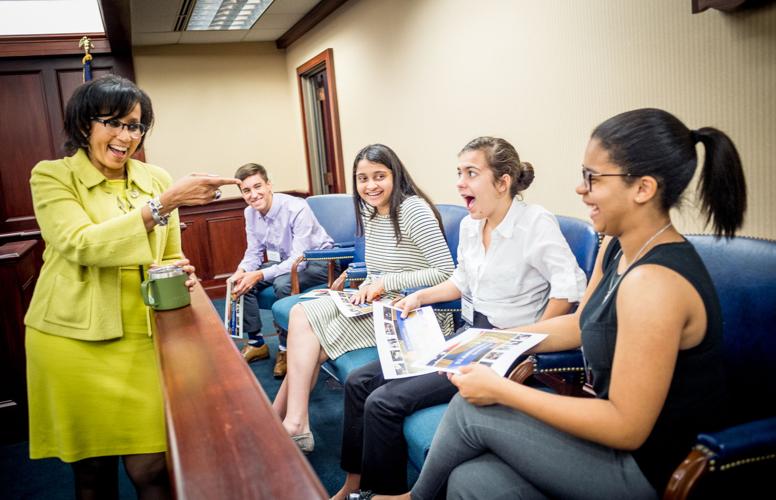Inside a federal courtroom on the fourth floor of a Poydras Street building, a 70-pound yellow Labrador called Ting rested on his belly, as if ready for a nap. His caregiver, Katherine Barton Scanlan, a special agent and canine handler with the U.S. Bureau of Alcohol, Tobacco, Firearms and Explosives, explained how the docile pup helps secure major public events and federal buildings and investigates crime scenes by searching for explosives.
The audience, a group of 24 teenagers, greeted the speaker with many questions.
“How old are the dogs when they retire?” asked one student. (They retire at about 10 years old.) “Can people pet him?” inquired another. (You have to ask the handler first.) And the most intriguing question of them all: “Has Ting ever found a bomb?” (He once detected an explosive in the trunk of a car.)
The small crowd applauded as the agent concluded her presentation. Up next, a U.S. Marshal talked about his organization’s role with the witness protection program and the most wanted list.
The day of presentations were part of the Suit Up for the Future High School Summer Legal Institute and Internship Program – a three-week workshop that immerses forward-thinking teenagers into the legal field, introduces them to the various agencies operating within the justice system and ultimately helps them decide whether they want to become lawyers.
“Most people, when they think of the court system, think of the judge and maybe of the judge’s staff, but they don't know that we have a whole team behind us that supports us so that we can do our job,” said Chief U.S. Magistrate Judge Karen Wells Roby.
Suit Up for the Future was established eight years ago by the Louisiana State Bar Association, Louisiana Bar Foundation and Just the Beginning, along with four Louisiana law schools: Loyola University New Orleans College of Law, LSU Paul M. Hebert Law Center, Southern University Law Center and Tulane University Law School.
At the time, Roby said, the legal profession lacked diversity.
“We need to be a reflection of the community that we live in,” she said. “As a federal judge, it's important for me to see diversity in the courtroom because it gives legitimacy to the proceeding, and people don't feel as though their rights don't matter.”
Roby wants adolescents to know that, no matter their backgrounds, they can pursue careers in the justice system.
“If you don’t have anyone in your family who's a lawyer, the odds are, you won't go to law school,” Roby said. “But if you see that there are people who look like you, that didn't have a family member who was a lawyer but became successful, then it makes you think: ‘Well, maybe I can do this.’”
During the program, teens previewed law school courses, created resumes and received feedback from legal mentors. They shadowed attorneys on a typical workday. A mock trial problem was transformed into a legal writing assignment, and they created an oral argument, which they later presented to a panel of judges.
They also toured local law schools, the Supreme Court of Louisiana and its museum, along with federal court buildings.
Participant Amaya Felix, a 17-year-old student at Lutheran High School in Metairie, set her sights on a legal career before she even enrolled in Suit for the Future. But the program has given her insight as to what type of lawyer she’d like to be, and how she’s going to become one.
“The program helped me build my path during the law school visits, and I learned about my likes and dislikes (of being an attorney) during the shadowing day,” she said, adding that the encouragement from her peers and mentors has pushed her closer to her career goals.
“I get good vibes from them all the time,” Felix said.
The program’s collaborative spirit allows students to develop new ideas and perspectives.
“The way the program is structured helps them open their minds and think differently about the world that we live in,” said Tricia Pierre, the director of diversity and outreach for the Louisiana State Bar Association.
“They're able to see how important lawyers are, how they play a role in our society and in the administration of justice and how that affects their daily lives.”
Roby said most students seem shy in the beginning of the program: They’ve likely never given a speech, engaged in a debate or stepped foot inside a courthouse.
“They always ask me, 'Are you like Judge Judy?' And I say: ‘I hope not, because she fusses at people, and we try not to be that way,'” Roby said. “They learn that what they see on TV is not what the profession is. That builds their confidence, not only in their ability to speak out, not only in their writing skills, but in their outlook, and in the potential of their future.”






